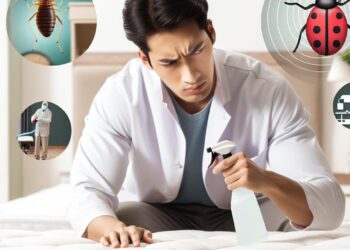Adapting Pest Control Strategies in the Face of Climate Change
Climate change is one of the biggest challenges facing our planet today. Its impact on the environment is undeniable, and it has far-reaching consequences for all living things, including pests. As temperatures rise and weather patterns become more unpredictable, pests are adapting their behavior’s and shifting their habitats, making it essential for pest control professionals to adapt their strategies accordingly.

The Impact of Climate Change on Pest Infestations
Climate change is causing significant changes to the environment, including an increase in temperature, changes in rainfall patterns, and extreme weather events such as floods and droughts. These changes have a profound effect on pest populations, as they create new habitats and disrupt natural cycles.
One of the most significant impacts of climate change on pest infestations is the increase in the number of pests. Warmer temperatures and longer growing seasons provide more opportunities for pests to breed and thrive, leading to larger populations. This increase in pest populations can lead to more severe infestations and greater damage to crops and property.
Climate change is also causing pests to shift their habitats. As temperatures rise, pests are moving to new areas where they can find suitable conditions for survival. For example, the spread of the Asian tiger mosquito in Europe is linked to rising temperatures, which have allowed the mosquito to survive in areas where it previously could not.

How to Adapt Your Prevention and Control Strategies
Adapting pest control strategies to address the impact of climate change is essential for effective pest management. Here are some ways to adapt your prevention and control strategies:
- Monitor pest populations regularly: With the increase in pest populations, it is essential to monitor them regularly. Regular monitoring will help you identify pest infestations early and take action before they become severe.
- Use environmentally-friendly pest control methods: As the environment changes, it is crucial to use pest control methods that are less harmful to the environment. Chemical pesticides can have negative effects on the environment, so it is essential to explore alternative methods such as biological control, traps, and cultural control.
- Adjust your timing: Changes in weather patterns can affect the timing of pest management activities such as spraying. It is important to adjust your timing according to the weather conditions to ensure that your pest management measures are effective.
- Implement integrated pest management (IPM): IPM is a comprehensive approach to pest management that uses a combination of methods to control pests. It involves monitoring pest populations, using a range of pest control methods, and minimizing the use of chemicals. IPM is an effective way to adapt to the impact of climate change on pest infestations.
 Source: Google Images
Source: Google Images
Climate change is having a significant impact on pest infestations. As pest control professionals, it is essential to adapt our prevention and control strategies to address these changes. By monitoring pest populations regularly, using environmentally-friendly pest control methods, adjusting our timing, and implementing integrated pest management, we can effectively manage pest infestations and protect our crops and property. It is critical that we take action now to adapt to the impact of climate change on pest infestations and ensure a sustainable future for our planet.
The Effects of Climate Change on Pest Infestations
Climate change is causing a range of environmental changes, including an increase in temperature, changes in rainfall patterns, and extreme weather events such as floods and droughts. These changes have a significant impact on pest populations, as they create new habitats and disrupt natural cycles. The warmer temperatures and longer growing seasons provide more opportunities for pests to breed and thrive, leading to larger populations. The increase in pest populations can lead to more severe infestations and greater damage to crops and property. Climate change is also causing pests to shift their habitats. As temperatures rise, pests are moving to new areas where they can find suitable conditions for survival.
Adapting Pest Control Strategies to Climate Change
Adapting pest control strategies to address the impact of climate change is essential for effective pest management. With the increase in pest populations, it is essential to monitor them regularly. Regular monitoring will help you identify pest infestations early and take action before they become severe. As the environment changes, it is crucial to use pest control methods that are less harmful to the environment. Chemical pesticides can have negative effects on the environment, so it is essential to explore alternative methods such as biological control, traps, and cultural control.
Changes in weather patterns can affect the timing of pest management activities such as spraying. It is important to adjust your timing according to the weather conditions to ensure that your pest management measures are effective. Implementing integrated pest management (IPM) is an effective way to adapt to the impact of climate change on pest infestations. IPM is a comprehensive approach to pest management that uses a combination of methods to control pests. It involves monitoring pest populations, using a range of pest control methods, and minimizing the use of chemicals.

It is important to note that adapting pest control strategies is not only crucial for effective pest management but also for the environment and human health. The use of chemical pesticides can have negative effects not only on the environment but also on human health. As pest control professionals, it is our responsibility to use environmentally-friendly methods that are less harmful to the environment and human health.
In addition to adapting our pest control strategies, it is also essential to raise awareness about the impact of climate change on pest infestations. Education and awareness can help individuals and communities take action to reduce their impact on the environment and minimize the effects of climate change.
Conclusion
In conclusion, climate change is having a significant impact on pest infestations, and it is essential to adapt our prevention and control strategies accordingly. By monitoring pest populations regularly, using environmentally-friendly pest control methods, adjusting our timing, and implementing integrated pest management, we can effectively manage pest infestations and protect our crops and property. It is crucial that we take action now to adapt to the impact of climate change on pest infestations and ensure a sustainable future for our planet. Raising awareness about the impact of climate change on pest infestations and collaborating with other professionals in the industry can lead to the development of new and innovative pest control strategies that are adapted to the changing environment. By working together, we can create a more sustainable future for ourselves and future generations.















